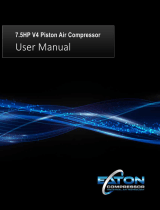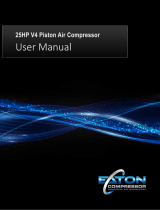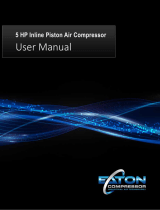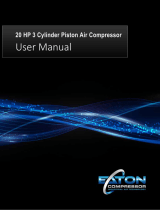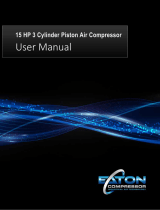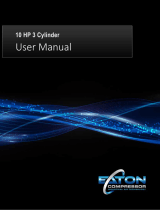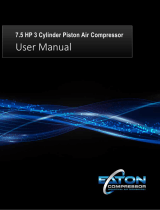Page is loading ...

SPLASH LUBRICATED
AIR COMPRESSOR PUMPS
Operating Instructions
Airbase Industries designs and manufactures products for safe operation. However, operators and maintenance persons
are responsibile for maintaining safety. All safety precautions are included to provide a guideline for minimizing the
possibility of accidents and property damage while equipment is in operation.
Keep these instructions for reference.
AMNU000001 0810
Unit configuration
and appearance
varies by model.
Contents
Page No.
Model Specification Charts ............. 2
Safety Information ................... 3
Tag Definitions .................... 3
Basic Guidelines ................... 3
Breathable Air .................... 3
Personal Protective Equipment ......... 3
Inspection ......................... 3
Installation ........................ 3
Area ........................... 3
Piping Safety Steps ................. 4
Tank Installation .................. 4
Pump Installation .................. 5
Page No.
Operation ......................... 6
Safety Rules ..................... 6
Start Up ........................ 6
Maintenance ....................... 7
Safety Steps ..................... 7
Belt Adjustment ................... 7
Changing Oil ..................... 7
Maintenance Schedule ................. 7
Troubleshooting ..................... 8
Warranty .......................... 8

2
Splash Lubricated, Air Compressor Pumps
Model APP2V0313S APP3Y0518S APP2V0732S
Description 3HP 5HP 7.5HP
CFM Displacement 13 18 32
CFM @ Pressure
(100 psi) 10.2 14.1 18
Max PSI 145 145 145
Noise DB(A) 75 75 74
Outlet Connection NPT 1/2” NPT 1/2” NPT 3/4”
Pump RPM 850 950 680
Bolt Pattern 8-3/16 x 4-5/8 8-1/4 x 5-1/4 10-1/4 x 5-3/8
Dimensions 15 x 10 x 13 18 x 15 x 12 18 x 15 x 12
Weight (lbs.) 60 75 121
Belt Type (A or B) A A B
Number of Belts 1 2 2
SINGLE STAGE
Splash Lubricated, Air Compressor Pumps
TWO STAGE
Splash Lubricated, Air Compressor Pumps
L•W•H
(inches)
Model APP3Y0521T APP2I0524T APP3Y0732T APP4V1043T APP3Y1544T APP3Y2062T APP4V2598T
Description
5HP - 3cyl 5HP- 2cyl 7.5HP 10HP 15HP 20HP 25HP
CFM
Displacement
21 24 32 43 44 62 98
CFM @ Pressure
(100 psi)
18 17 24 34 35 52 91
Max PSI
175 175 175 175 175 175 175
Noise DB(A)
74 75 75 75 75 75 79
Outlet
Connection
NPT 3/4” NPT 3/4” NPT 3/4” NPT 3/4” NPT 1-1/4” NPT 1-1/4” NPT 1-1/4”
Pump RPM
895 795 830 600 640 640 710
Bolt Pattern
9-7/8 x 6-1/2 7-3/4 x 9 9-7/8 x 6-1/2 9-1/4 x 9-1/4 13-1/2 x 6-3/4 13-1/2 x 6-3/4 13-5/8 x 12
5/8
Dimensions 25 x 13 x 18 16 x 14 x 19 25 x 13 x 18 28 x 21 x 21 27 x 14 x 27 27 x 14 x 27 38 x 29 x 26
Weight (lbs.)
133 180 149 282 321 369 684
Belt Type
(A or B)
B B B B B B B
No. of Belts
2 2 2 2 3 3 4
L•W•H
(inches)

3
Operating Instructions
Safety
This manual contains very important information to
know and understand. This is provided for SAFETY
and to PREVENT EQUIPMENT PROBLEMS. To help un-
derstand this information, observe the following:
Danger indicates an imminently
hazardous situation which, if not
avoided, will result in death or serious injury.
Warning indicates a potentially
hazardous situation which, if not
avoided, could result in death or serious injury.
Caution indicates a potentially
hazardous situation which, if not
avoided, may result in minor or moderate injury.
Notice indicates important infor-
mation, that if not followed, may
cause damage to equipment.
Basic Guidelines
1. Allow only trained, authorized persons who
have read and understood these operating
instructions to use this compressor pump. Fail-
ure to follow the instructions, procedures and
safety precautions in this manual can result in
accidents and injuries.
2. NEVER start or operate the compressor pump
under unsafe conditions. Tag the compres-
sor, disconnect and lock out all power to it to
prevent accidental start-up until the condition
is corrected.
3. Install, use and operate the compressor pump
only in full compliance with all pertinent OSHA
regulations and all applicable Federal, State &
Local Codes, standards and regulations.
4. NEVER modify the compressor pump and/or
controls in any way.
5. Keep a first aid kit in a convenient place. Seek
medical assistance promptly in case of injury.
Avoid infection by caring for any small cuts
and burns promptly.
Breathable Air
1. NEVER use air from this compressor pump for
breathable air except in full compliance with
OSHA Standards 29 CFR 1910 and any other
Federal, State or Local codes or regulations.
MANUAL
Read all manuals included with this
product carefully. Be thoroughly
familiar with the controls and the
proper use of the equipment.
Death or serious injury can result
from inhaling compressed air
without using proper safety
equipment. See OSHA standards
on safety equipment.
2. DO NOT use air line anti-icer systems in air
lines supplying respirators or other equip-
ment used to produce breathable air. DO NOT
discharge air from these systems in unventi-
lated or other confined areas.
Personal Protective Equipment
Be sure all operators and others around the
compressor and its controls comply with all appli-
cable OSHA, Federal, State and Local regulations,
codes and standards relating to personal protec-
tive equipment. This includes respiratory protec-
tive equipment, protection for the extremities,
protective clothing, protective shields and barri-
ers, electrical protective equipment, and personal
hearing protective equipment.
Inspection
Inspect compressor pump prior to
any use. Check for external damage
that might have occurred during
transit. Be careful of moving parts
then test pulley by turning it
freely by hand. Report any dam-
age to delivery carrier immediately.
Do not operate unit if damaged
during shipping, handling or use.
Damage may result in bursting and cause injury or
property damage.
Installation
Area
1. Install compressor pump in a clean, dry and
well-lit area. Be sure installation area can
maintain a temperature range between 35˚ -
110˚ F.
2. Insulate cold water or other low temperature
pipes that pass overhead to avoid conden-
sation dripping on compressor which could
cause rust and/or motor shorting.
DO NOT install compressor in boiler
room, paint spray room, or area
where sandblasting occurs. Make
sure inlet air is away from exhaust
fumes or other toxic, noxious or
corrosive fumes or substances.

4
Splash Lubricated, Air Compressor Pumps
3. If acid is used in operating environment
or air is dust laden, pipe intake to outside,
fresh air. Increase pipe size by one size for
every 20 feet of run. Be sure to install pro-
tective hood around intake filter.
4. In operating environments where excessive
water, oil, dirt, acid or alkaline fumes are
present, a TEFC (totally enclosed, fan cooled)
motor is recommended. Check nameplate for
motor type.
5. Allow sufficient space around compressor
pump for maintenance access. Mount unit
with pulley towards wall and leave a mini-
mum of 15 inches of clearance.
6. Use shims to level compressor if installation
area is not flat. This will avoid excessive
vibration and premature pump wear.
Piping
Safety Steps
1. Install appropriate flow-limiting valves as
necessary according to pipe size(s) used and
run lengths. This will reduce pressure in case
of hose failure, per OSHA Standard 29 CFR
1926.302(b)(7).
2. Flow-limiting valves are listed by pipe size
and rated CFM. Select appropriate valves
accordingly, in accordance with the manufac-
turer’s recommendations.
Tank Installation
1. Place tank feet
on 1/4” thick rubber pads.
Thicker padding will increase vibration and
the possibility of cracking the tank or other
unit damage.
Do not place unit on dirt floor
or uneven surface.
2. Fasten anchor bolts snugly but do not overtight-
en so normal vibration will not damage unit.
Compressor unit is top heavy and
must be bolted to solid, flat surface
to avoid falling and premature pump wear. Splash
lubrication will not operate properly if unit is not level.
Pump Installation
1. Mount pump to deck of tank then connect
main feed port to check valve in tank. See
figure 1.
2. For units with centrifugal unloader system,
install 1/4” copper tubing from 90˚ elbow
(located in front of crankcase) to the un-
loader port of check valve.
NOTE: If pump is not equipped with centrifugal
unloader, install an unloader line from the check
valve unloader port to the unloader port of the
pressure switch. This will relieve head pressure
when unit stops and provide no-load restarting.
3. Cap fitting on cylinder heads if not using
pilot valve for continuous run port.
4. Make sure there is a 1/4” copper tube (un-
loader tube) installed from tank check valve
to unloader on pressure switch. This relieves
head pressure when compressor stops for
easier restart. See figure 2.
5. Use proper pulley for motor. Refer to Pulley
Size Chart for correct sizing.
6. Install belts. There should be 1/2” slack for
proper belt tension. See figure 3.
7. Use a flexible connector between compressor
tank and piping system to minimize noise,
vibration, unit damage, and pump wear.
Figure 1: Connect feed port to check valve
Check
valve
Figure 2: Install unloader line from
check valve to pressure switch
Pressure switch
with unloader
Figure 3: Proper belt tension
1/2” deflection

5
Operating Instructions
8. Install appropriate ASME code safety valves
and make sure piping system is equipped
with adequate condensate drains. See figure
4.
Never install a shut-off valve such
as a glove or gate valve, between
the pump discharge and the air
tank unless a safety valve is
installed in the line between valve
and pump.
9. Make sure any tube, pipe or hose connected
to the unit can withstand operating tem-
peratures and retain pressure.
Never use plastic (PVC) pipe for
compressed air. Serious injury or
death could result.
10. Never use reducers in discharge piping. Keep
all piping and fittings the same size in the
piping system.
11. For permanent installations of compressed
air systems, determine total length of sys-
tem and select correct pipe size. Make sure
underground lines are buried below frost line
and avoid areas where condensation could
build up and freeze.
Ball
Valve
Water Drain Valve
Air Tank
Air Dryer
Coalescing Filter
with Auto Drain
To Shop
Piping
Figure 4: Basic Piping Diagram
Minimum Pipe Size For Compressed Air Lines
(Pipe size shown in inches)
Length Of Piping System
SCFM 25 ft. 50 ft. 100 ft. 250 ft.
20 3/4 3/4 3/4 1
40 3/4 1 1 1
60 3/4 1 1 1
100 1 1 1 1-1/4
125 1-1/4 1-1/4 1-1/2 1-1/2
Pulley Size Chart
(Pulley size in inches)
Pump Electric 1750 RPM 3450 RPM Gas Engine Gas Engine
Model No. Motor - Hp 4 Pole Motor 2 Pole Motor Hp Pulley Size
APP2V0313S
3 5.5 2.75 5.5 3
APP3Y0518S
3 5.5 2.75 6.5 3
APP3Y0518S 5 5.75 2.75 6.5 3
APP3Y0521T 5 7 3.5 8 3.5
APP2V0732S
5 5.5 2.75 8 3
APP2I0524T
5 7.7 3.8 11 4
APP3Y0732T
5 6 3 11 3
APP3Y0732T 7.5 7 3.5 13 4
APP4V1043T
7.5 6.4 3.2 13 3.2
APP4V1043T
10 8.8 4.4 18 4.4
APP3Y1544T
10 9 4.5 24 4.5
APP3Y2062T
15 9 4.5 28 4.5
APP4V2598T
20 9 4.5 40 4.5
APP4V2598T
25 11.5 5.8 50 5.8
Splash lubricated pumps require 550 RPM for proper lubrication.
Be sure to size motor and engine pulleys correctly.

6
Splash Lubricated, Air Compressor Pumps
12. Test entire piping system before underground
lines are buried. Be sure to find and repair
all leaks before using compressor.
Never exceed recommended
pressure or speed while operating
compressor.
Be sure to install beltguard on
compressor unit after pump
installation is complete.
Operation
Safety Rules
1. Make sure all operators receive product train-
ing, read and understand all instructions.
Keep all flammable, combustible,
poisonous and noxious materials
away from operating area. Make
sure there are no oily rags, trash,
leaves, litter or other combustible
materials in operating area. Keep
suitable, fully charged fire extinguishers nearby
when servicing and operating the compressor.
2. NEVER allow modifications to compressor struc-
ture or controls.
3. Keep all ignition sources away from exposed
electrical parts.
4. Keep all persons clear of compressor during
start-up and operation.
5. NEVER operate the compressor with the fan,
coupling or other guards removed.
6. DO NOT engage in horseplay with air hoses as
death or serious injury may result.
7. Make sure to provide adequate ventilation
and use proper lubricant while operating the
compressor. If lubricant or other combustible
substances are spilled, clean up immediately.
8. When checking or adding lubricant or when re-
filling air line anti-icer systems with antifreeze
compound, shut off compressor and allow it to
cool. Keep sparks, flames and other ignition
sources away and DO NOT permit smoking in the
vicinity.
9. Stop compressor and disconnect power if a
hazardous condition arises.
10. Wear snug fitting clothing and confine long hair
when around compressor. Keep all body parts
and clothing away from couplings, flywheel and
other moving parts of the equipment.
Keep all persons away from the
discharge opening of hoses or tools
or other points of compressed air
discharge. If the machine is
installed in an enclosed area, be
sure to vent the relief valve outside
of the structure or to an unoccupied area.
11. DO NOT use air tools that are rated below the
maximum rating of the compressor. Select
air tools, air hoses, pipes, valves, filters and
other fittings accordingly. DO NOT exceed
manufacturer’s rated safe operating pressures
for these items.
12. Make sure all hose connections are adequate-
ly secured to prevent tools or hose ends from
being accidentally disconnected.
Start-Up
1. This unit may or may not contain oil when
shipped. Be sure to check for proper oil level
before operating the compressor. Oil should
be in center of site glass. See figure 5.
Use only Airbase Industries oil
(PN: APOL03000G1). Use of any
other product will cause product damage and void
the warranty.
2. Check for proper belt tension. There should
be 1/2 inch slack. Refer to figure 3, pg. 4.
Always make sure main power is
off before touching belts or other
moving parts of compressor.
3. Push power switch to make sure system is
working.
4. Ensure motor rotation is correct. Refer to
unit operating instructions if necessary.
Figure 5: Check proper oil level
Oil level should be to
center of red circle in
site glass

7
Operating Instructions
Maintenance
Safety Steps
Disconnect, tag and lock out power
source then release all pressure from
the system before attempting to
install, service, relocate or perform
ANY maintenance.
1. Make sure repairs are done in a clean, dry, well
lighted and ventilated area.
2. When cleaning, use air pressure less than 30
psig (2.1bar). NEVER use flammable solvents
for cleaning purposes. Also use effective chip
guarding and personal protective equipment
per OSHA standard 29 CFR 1910.242 (b).
3. Relieve all internal pressure prior to opening
any line, fitting, hose, valve, drain plug, con-
nection or other component, such as filters and
line oilers, and before refilling optional air line
anti-icer systems with antifreeze compound.
Compressor components can
become hot during operation.
Avoid bodily contact with hot
liquids, hot surfaces and sharp
edges and corners.
Belt Adjustment
Be sure to relieve all system
pressure then lock out power and
tag compressor to prevent
unexpected movement of the unit.
Inspect belt tension after first 30 hours of operation
then every 30 days.
1. Proper belt tension is determined by pressing
on belt midway between motor pulley and
flywheel. There should be approximately 1/2
inch of deflection. Refer to figure 3, pg. 4.
2. Always replace all belts with the same brand,
at the same time. Make sure belts are uni-
matched. Do not replace belts independently.
3. Do not splash lubricating oil on belts or pul-
leys when adjusting or replacing belts.
Changing Oil
Some units are shipped with break-in oil. Change oil
within first 50 hours or 30 days of operation, which-
ever comes first. DO NOT use automotive type oil.
Use only Airbase Industries oil
(PN: APOL03000G1). Use of any
other product will cause product damage and void
the warranty.
Change oil every 90 days or if oil becomes milky.
High humidity and excessive temperature changes
can cause moisture to form in the pump. This mois-
ture will cause oil to break down and become milky.
Be sure to check oil regularly for proper lubrication.
Make sure to dispose of used parts such as oil and
filters in accordance with all applicable regulations.
Maintenance Schedule
Daily
Weekly
Monthly
Every 3 months
Check oil level
Check for unusual operation. Correct
before damage occurs.
Change oil
Clean air filter
Change oil (after first 50 hours)
Check and tighten all bolts as required
Check all connections for air leaks
Check belts for proper tension, wear,
and alignment
Check safety valve
Drain tank and traps
Inspect valve assemblies
General unit cleaning
Check for unusual operation.
Correct before damage occurs.
Inspect oil for contamination.
Change if necessary.
Check all unloading lines for
leaks. Air leaks in unloader lines
will cause unloaders and pilot
valve to chatter and could cause
short cycling of motor.

8
Splash Lubricated, Air Compressor Pumps
Troubleshooting Chart
Problem Possible Causes Resolutions
Low air pressure
Overheating
1. Clogged inlet filter
2. Air leak(s) in system
3. Application exceeds rated air
output of compressor
4. Cylinder head valves not
sealing
5. Insufficient power
1. Duty cycle exceeded
2. Improper rotation
3. Head valve(s) not seating
properly
4. Blown cylinder head gasket(s)
5. Restriction in head,
intercooler or check valve
6. Low oil
7. Dirt in intercooler fins or
cylinder fins
8. Poor ventilation / ambient
temperature too high
1. Disassemble valve, clean thorougly
2. Use soapy water to locate leaks, replace or tighten
threaded parts
3. Check CFM requirements, change tool or use compressor
with higher air output
4. Remove valves from cylinder head, repair or replace as
necessary
5. Check power supply, rewire as necessary
1. Keep duty cycle at 60/40 to maintain pump life
2. When facing flywheel, ensure counter-clockwise
rotation
3. Clean or replace
4. Replace gasket(s)
5. Clear blockage
6. Add oil. Ensure oil level is at middle of site glass. See
figure 5, pg. 6.
Use only Airbase Industries oil (PN:
APOL03000G1). Use of any other
product will cause product damage and void the warranty.
7. Use low pressure air to blow dirt away from compressor
8. Increase ventilation around operating area. Ensure
compressor has adequate clear space from walls and
other possible obstructions. Ambient temperature
should not exceed 110˚ F.
Airbase Industries makes the following WARRANTY STATEMENT:
1. THAT EACH BARE COMPRESSOR PUMP UNIT TO BE FREE FROM DEFECTS IN MATERIAL, WORKMANSHIP, AND PARTS FOR 2 YEARS FOR THE UNIT FROM THE DATE
OF PURCHASE. Airbase Industries (and each of its subsidiaries) is not responsible for downtime during warranty service. If downtime is necessary, it is
the Purchaser’s discretion and obligation (at Purchaser’s expense) to have a redundant COMPRESSOR PUMP. Warranty repairs shall not include freight costs.
Purchaser is responsible for returning unit to Airbase Industries. This PUMP MUST have Airbase Industries Lubricant Synthetic exclusively, the same which
must be purchased from Airbase Industries. (Mixing different brands of oil will void this warranty).
A service kit must be purchased from Emax or an Emax
dealer for this warranty to apply. Service kits contain an air filter and synthetic oil that must be changed annually. Annual proof of purchase of all oil programs must
be maintained by the original purchaser of the compressor pump.
If the unit runs out of oil, this warranty is void. Failure to fully comply with this warranty
and fully comply with the manual herein will void this warranty.
Exclusions include: service such as OIL CHANGES, FILTER REPLACEMENTS, GASKET TIGHTENING TO CORRECT OIL SEEPAGE or DRIVE BELT TIGHTENING and VALVE
CLEANING and are not covered under warranty.
Warranty shall be void under the following conditions: Failure to routinely change oil and to maintain a clean filter, or exceeding 70% duty cycle resulting in
overheating and excessive wear and tear, or exposing electrical components to rain or water, or installing the unit in a hostile environment such as acid vapors
or any caustic or abrasive matter that may be ingested into the pump, or installing the unit in an enclosed area where lack of cooling ventilation is present,
such as in boiler or equipment rooms where the ambient air exceeds 100˚F.
Airbase Industries shall not be held liable for any malfunction of BARE COMPRESSOR PUMP UNIT caused by failure or improper use and/or maintenance of other
compressor components manufactured by others.
2. GENERAL PROVISIONS: Airbase Industries (and each of its subsidiaries) is not responsible for downtime during warranty service. If downtime is necessary, it is the
Purchaser’s discretion and obligation (at Purchaser’s expense) to have a redundant compressor. Warranty repairs shall not include freight costs. If necessary, the
Purchaser is responsible for returning unit and/or applicable part(s) to Airbase Industries.
Exclusions include: service such as OIL CHANGES, FILTER REPLACEMENTS, GASKET TIGHTENING TO CORRECT OIL SEEPAGE or DRIVE BELT TIGHTENING and VALVE
CLEANING and are not covered under warranty.
Further Exclusions include failure to fully and completely follow the guidelines set forth in the manual. Of specific note is where a product is used where granite and/
or concrete work is performed or conditions are dusty and the product is required to be housed in a separate room from the adverse conditions where the product has
access to fresh air intake.
Parts used for warranty purposes must be supplied by Airbase Industries. Warranty work will be performed by an approved Airbase Industries Technician. If
any maintenance (other than routine maintenance) is performed by a non-approved Airbase Industries Technician, written pre-approval must be obtained from
Airbase Industries to prevent voiding this Warranty. Failure to fully comply with this warranty and fully comply with the manual herein will void this warranty.
All warranties are nontransferable.
The Oil Purchase Program is effective as of January 1, 2011.
/
